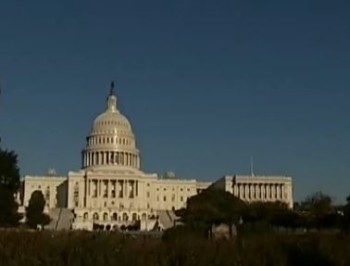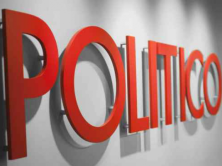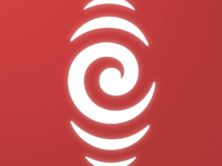
(Credit: YouTube, "ITN," screenshot)
In the wake of the federal government shutdown, it was clear to most pundits and political leaders that the Republican Party’s “brand” was tarnished, with the Speaker of the House admitting defeat, and with other Republican leaders criticizing their own party for causing it.
An examination of several polls taken during the shutdown, however, revealed only modest support for these conclusions. But there were two polls, I suspect, that convinced GOP leaders that the shutdown was devastating for their party and had to be avoided in the future.
The polls that showed Republicans taking only a modest hit for the shutdown include the following (see The Polling Report for details of the polls, except where otherwise indicated):
- A Pew poll, conducted Oct. 9-13, found 46% of Americans blaming the Republicans for the shutdown, compared with 37% pointing their fingers at the Obama administration. That 9-point difference suggests the GOP was taking only a modest hit for their actions.
- An ABC/Washington Post poll, over the same time period, reported 53% of Americans disapproving of the way Obama was handling the crisis, with 74% disapproving of congressional Republicans, and 61% disapproving of congressional Democrats. Clearly, the GOP fared worst in this poll, but the Democrats and Obama didn’t fare too well either.
- A United Technologies/National Journal poll, conducted Oct. 3-6, reported that by 45% to 37%, Americans trusted Obama more than congressional Republicans to make decisions about the federal budget and deficit. Again, a relatively small difference of just eight points.
- A CNN poll, conducted in the same time period, concluded there was “plenty of blame to go around,” with 63% of Americans angry at Republicans, 57% angry at Democrats, and 53% angry at Obama. There is slightly more anger for Republicans than Democrats, but majority anger for all.
- A Pew poll, conducted in the same time period as the two previous ones, showed only an 8-point margin giving more blame to congressional Republicans than the Obama administration, and it showed that to resolve the stalemate, the public was about evenly divided as to who should give ground – 44% said Republicans, 42% said Obama.
While all these polls suggest the Republicans were faring worse than the Democrats in the public’s mind, the differences hardly seemed devastating.
However, two polls provided clear evidence of a major gap in the blame game. It is these two polls that could very well have provided the critical turning point in the thinking of many GOP leaders: an NBC/Wall Street Journal poll, conducted Oct. 7-9, and a Gallup poll, conducted Oct. 3-6.
Gallup reported that the Republican Party’s “favorability” rating had sunk to 28%, the lowest of either party in the 21-year history of measuring party favorability. And it showed a 15-point gap between the two major parties.
The most dramatic part of the trend was the 10-point drop from September to October. This was similar to the 12-point drop in December 1998, after the Republicans voted to impeach President Clinton.
The NBC/WSJ poll reaffirmed the low rating of Republicans, with just 24% of Americans saying they felt positive toward the party, compared with 39% feeling positive toward the Democrats.
But more important, this poll found a stunning 22-point difference between the percentage who blamed the Republicans in Congress for the shutdown (53%) and the percentage who blamed Obama (31%).
The poll also showed that by a margin of 47% to 39%, voters would prefer a Congress controlled by Democrats over one controlled by Republicans. If this sentiment were to prevail in the 2014 mid-term elections, the Democrats could possibly win back control of the House. (These results were reaffirmed in the latest CNN poll, also showing Democrats with an 8-point advantage over Republicans.)
What made the NBC/WSJ poll so important is that it was co-conducted by Republican Bill McInturff, a major GOP pollster, along with Democratic pollster, Peter Hart. Republican leaders listen to McInturff, who characterized the results as showing an “ideological boomerang” against Republicans: According to the poll, more Americans than before the shutdown now saw Obamacare as a good idea, opposed eliminating funding for it, and believed government should do more than it had been to solve problems.
That clearly was not the intended outcome desired by Congressional Republicans – nor other party leaders.
Despite these polls, in the final days of the shutdown, many House Republicans seemed defiant about what their efforts to shut down the government, some even suggesting they had “won.” Moreover, the most visible leader of the shutdown movement, Senator Ted Cruz, was as rebellious as ever, promising that the fight to end Obamacare would continue, even as he blamed his own party’s Senate leaders for the defeat.
Given these sentiments, some political leaders and pundits suggest another stand-off is quite likely in January and February, when the continuing resolution to fund the government and the new debt ceiling limit, respectively, will expire.
The truth is the GOP leaders in the House and Senate can avoid a shutdown if they choose – as they demonstrated in terminating the latest one. While individual Republicans who come from “safe” Congressional districts may not have to worry about re-election, party leaders have to worry about the party’s overall “brand” – and whether the party can continue to control the House, be competitive in taking control of the Senate, and field a competitive presidential candidate in 2016.
In the end, then, it’s the voters across the country who may have the most to say. And from what the polls reveal, especially the two highlighted above, voters won’t look favorably on yet another shutdown.

.JPG)






Comments Terms and Conditions